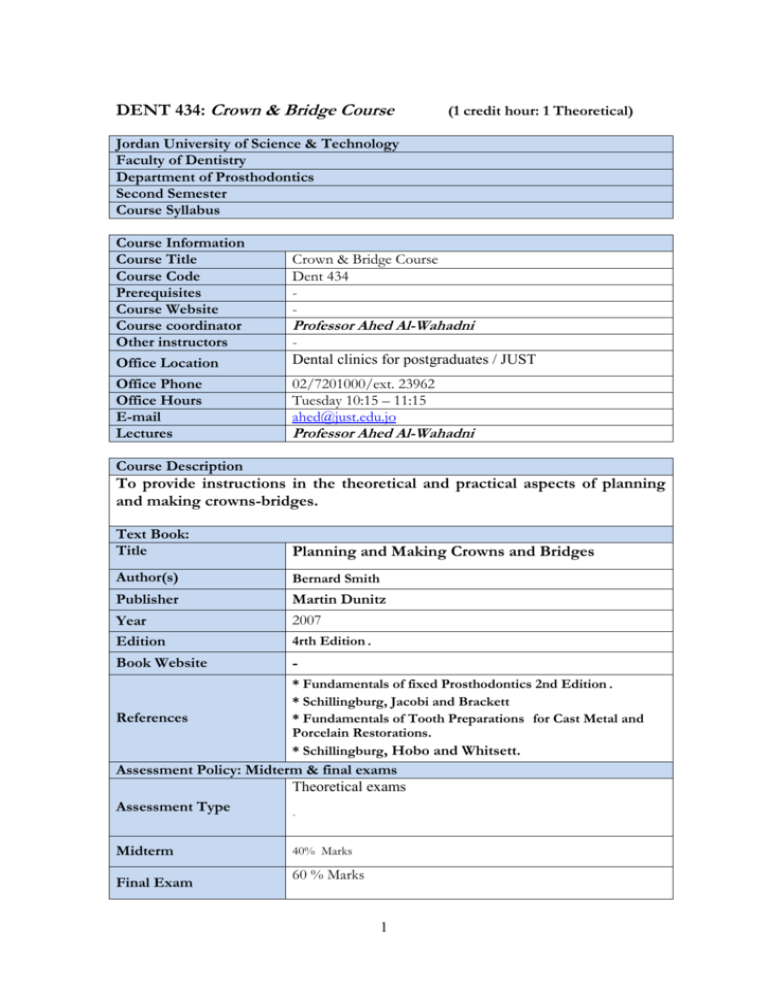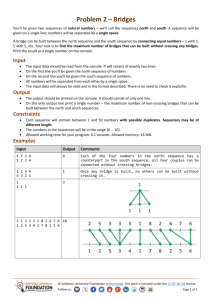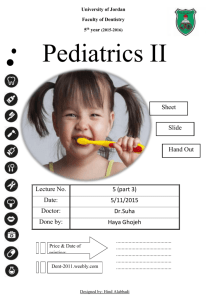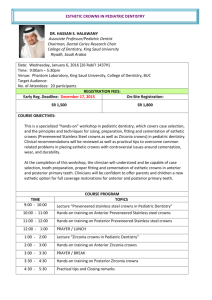DENT 434: Crown & Bridge Course - Jordan University of Science
advertisement

DENT 434: Crown & Bridge Course (1 credit hour: 1 Theoretical) Jordan University of Science & Technology Faculty of Dentistry Department of Prosthodontics Second Semester Course Syllabus Course Information Course Title Course Code Prerequisites Course Website Course coordinator Other instructors Office Location Office Phone Office Hours E-mail Lectures Crown & Bridge Course Dent 434 - Professor Ahed Al-Wahadni Dental clinics for postgraduates / JUST 02/7201000/ext. 23962 Tuesday 10:15 – 11:15 ahed@just.edu.jo Professor Ahed Al-Wahadni Course Description To provide instructions in the theoretical and practical aspects of planning and making crowns-bridges. Text Book: Title Planning and Making Crowns and Bridges Author(s) Bernard Smith Publisher Year Edition Martin Dunitz 2007 Book Website - References * Fundamentals of fixed Prosthodontics 2nd Edition. * Schillingburg, Jacobi and Brackett * Fundamentals of Tooth Preparations for Cast Metal and Porcelain Restorations. * Schillingburg, Hobo and Whitsett. 4rth Edition. Assessment Policy: Midterm & final exams Theoretical exams Assessment Type Midterm Final Exam 40% Marks 60 % Marks 1 Clinical Assignments - Attendance Mandatory Course Objectives Understand the principles of case assessment and selection. Weights 10% Understand the types of crowns & bridges and their selection principles as well as compare bridges with partial dentures and implantretained prostheses. Understand the principles of bridges components design. Understand the principles and procedures involved in crown-bridge work preparation, provisional crown & bridge construction and the fitting of crowns & bridges. Understand the periodontal and occlusal implications of crownBridgework. Understand the principles and process of the laboratory procedures involved in manufacturing metal, porcelain, and metal/ceramic crownbridgework. Identify failures and methods of repair. 20% 10% 30% 10% 5% 15% Teaching & Learning Methods Teaching duration: 16 weeks/Semester Classroom lectures. Small group teaching in the lecture room. Learning Outcomes: To provide instructions in the theoretical and practical aspects of planning and making crowns-bridges and at the end of the course the student should be able to: Related Objective(s) Understand the indications & contra indicators for crowns & bridges. Understand the types of crowns & bridges. Reference Chapters 1, 7 Understand the principles of designing & planning crowns & Chapters 3, 5, 9, 10 Chapters 2, 8 bridges. Understand the clinical techniques for crowns & bridges construction. Understand the periodontal & occlusal implications for crowns & bridges. Have an overview on adhesive dentistry (all – ceramic prostohesis Chapters 6, 11, lecture notes. Chapter 4, lecture notes. & RBB) Lecture notes + sections covered in the book Identify failures and methods of repair. Chapter 13 Useful Resources Recommended Text books and References: 2 Course Content Week Topics Course overview 5-2-2013 Chapter in text - 12-2-2013 Indications and contraindications for Crowns & Bridges Chapters 1, 7 19-2-2013 Types of Crowns & Bridges Chapters 2, 8 26-2-2013 Biomechanical principles of preparations Lecture notes. 5-3-2013 Designing and planning crowns and bridges Chapters 3,5,9,10 12-3-2013 Components of Bridges Chapter 9 19-3-2013 Clinical Techniques for Crown/ Bridge construction 2-4-2013 Adhesive Dentistry 1 9-4-2013 Adhesive Dentistry 2 16-4-2013 Post & core systems and management of difficult cases Chapters 6, 11, lecture notes Lecture notes + sections covered in the book Lecture notes + sections covered in the book Lecture notes + sections covered in the book 23-4-2013 Crown and Bridge Failures and Repairs. 30-4-2013 Occlusal considerations 7-5-2013 Periodontium & Crown/Bridgework 14-5-2013 Lab Work Procedures Chapter 13 Chapter 4, lecture notes 3 Lecture notes + sections covered in the book Lecture notes + sections covered in the book Additional Notes Make-up Exams Cheating Attendance Absenteeism Students with Special needs It is applicable when an acceptable and valid excuse is presented at the applicable time It is unethical and illegal by any means. JUST regulations will be applicable. It is mandatory for all lectures. JUST regulations will be applicable. To receive course credit, a student should attend a minimum of 90% of the contact hours of the class. Students who are absent for the lecture must contact the course coordinator prior to the class. If absent from lectures, then the course coordinator will refer to related guidelines set by the university. Any student who is absent on a test day, will have to demonstrate an acceptable medical or social statement explaining the illness or personal crisis as instructed by their faculty. Individual instructors may accommodate by arrangements for a make-up test only when a written request is sent to and approved by the Dean. Any student who feels that s/he may need accommodation for any type of disability is encouraged to contact the course coordinator who will be happy to help in any way. Accommodations to the course plan can be tailored to the needs of specific individuals after consultations with the dean. 4







